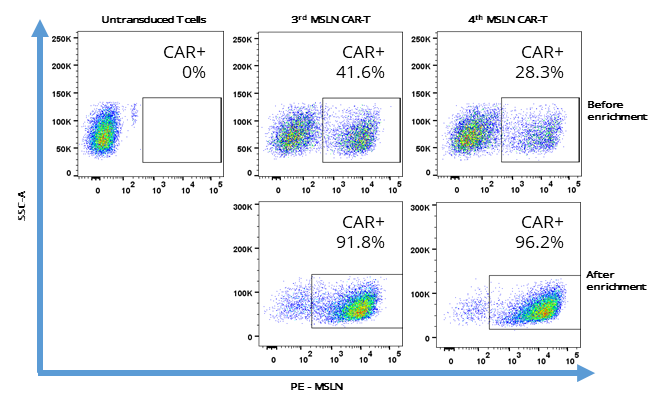PD-1 Blockade Protein in 4th Generation Armored CAR-T Cells Enhances Cytotoxicity Effect with in vitro Re-challenge System

Chimeric antigen receptor (CAR)-T cells are genetically engineered T cells that express a surface receptor to recognize tumor-associated antigens (TAA). CAR-T cell therapy have demonstrated remarkable success with hematological malignancies. However, limited headway has been made towards solid tumor, due to various challenges, including recognition of tumor-specific antigen trafficking and penetration, localization and survival within an immunosuppressive tumor microenvironment (TME) [1].
Overexpression of immunosuppressive cytokines and/or proteins, such as TGF-β and PD-L1, respectively, downregulates cytotoxic CD8+ T cells, reducing the efficacy of CAR-T cell therapy. Immune checkpoint inhibitors (ICIs), such as anti-PD-1/PD-L1 and anti-CTLA-4 antibody have gathered immense attention due to their efficacy across multiple solid malignancies [2]. As such, a combination of CAR-T and ICIs may prove to be a viable strategy to overcome an unfavorable TME.
Here, we have established a 4th generation, armored CAR-T coupled with a PD-1 blockade protein, to enhance the anti-exhaustion effect of CAR-T cells. Our results indicate that the addition of a PD-1 blockade protein reduces the amount of available PD-1 on the surface in both CAR-positive and -negative T cells, reduces exhaustion of CAR-T cells, and prolong cytotoxic killing effect of CAR-T cells in a 192 h in vitro re-challenge assay compared to 3rd generation CAR-T.

PD-1 blockade protein in 4th generation armored CAR-T cells enhances cytotoxicity effect with in vitro re-challenge system
Related Content
WuXi AppTec provides integrated and cost-effective services for: Polyclonal and monoclonal antibodies Anti-drug antibodies (ADA), host cell protein (HCP) antibodies,...
VIEW RESOURCEReview of SITC 2023 Annual Meeting The 38th Annual Meeting of the Society for Immunotherapy of Cancer (SITC) was held...
VIEW RESOURCE
